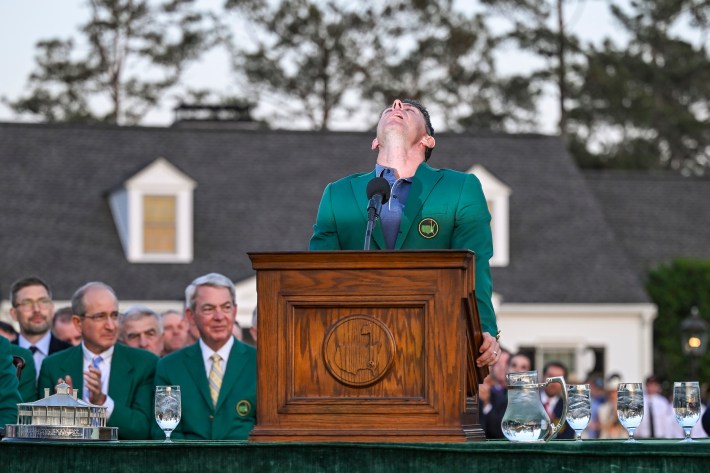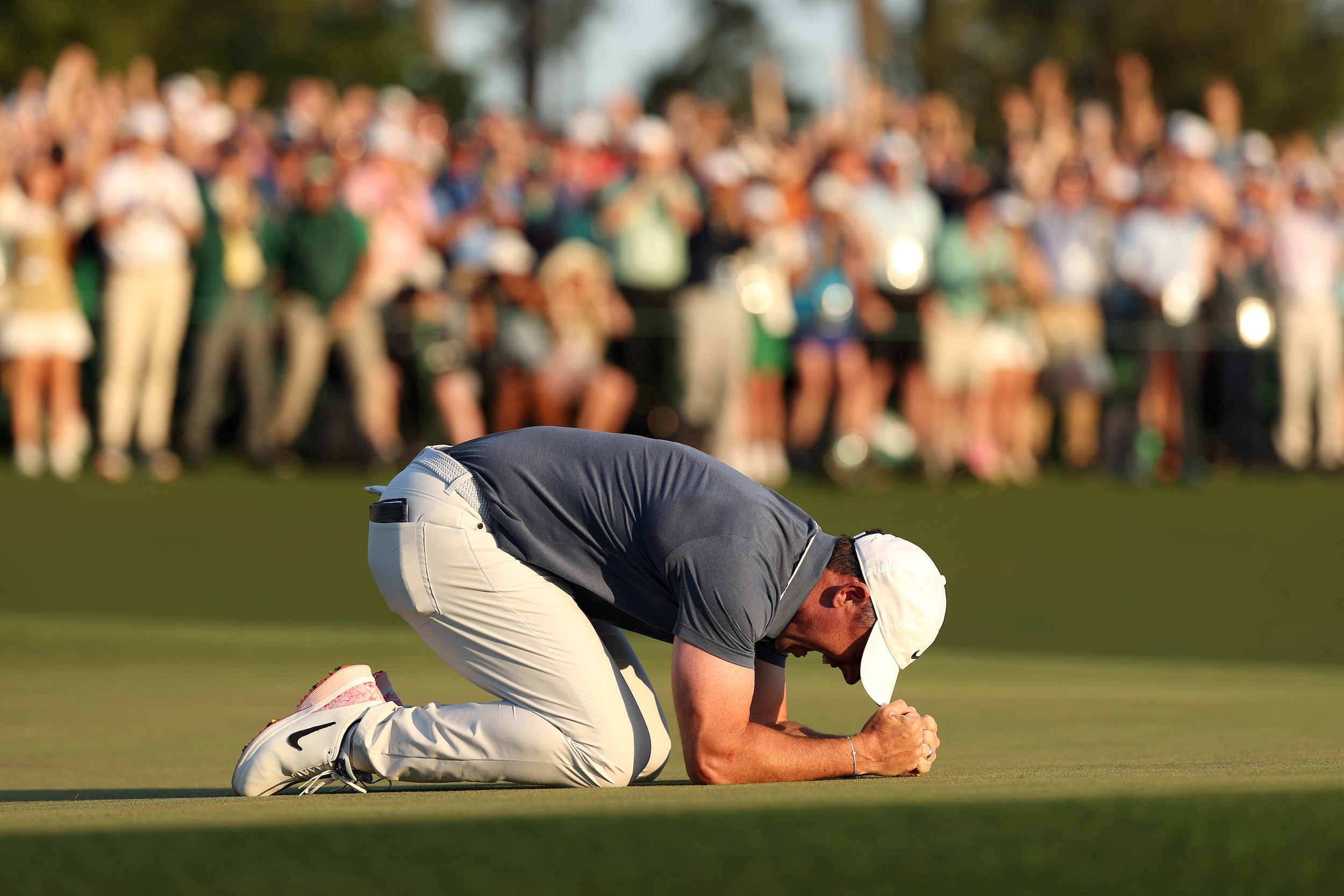What I like about that image up there is that it gives very little away. The shortened depth of field, which swirls the faces of spectators in lovely bokeh, leaves you with the raw emotions of the photo's subject. That subject is Rory McIlroy, the face of men's golf; the photo was taken Sunday on the 18th green of Augusta National, upon the completion of the final hole of the Masters Tournament. What is McIlroy feeling, there? Whatever it is, he is feeling a lot of it. I, the all-powerful blogger, know the answer. You, poor reader, are my prisoner: I could tell you anything! That is maybe an image of a man losing a golf tournament, and succumbing to crippling disappointment. Or, hell, maybe his caddy just told him that his grandmother died. Maybe the glow that lights this scene from behind the photographer is that of a huge mushroom cloud, and McIlroy is going Sarah Connor mode in his final moments. You don't know!
There are other, similar photos from this moment, only slightly less ambiguous. Is this anguish? Rage? Could it be joy? Surely it cannot be pure joy.

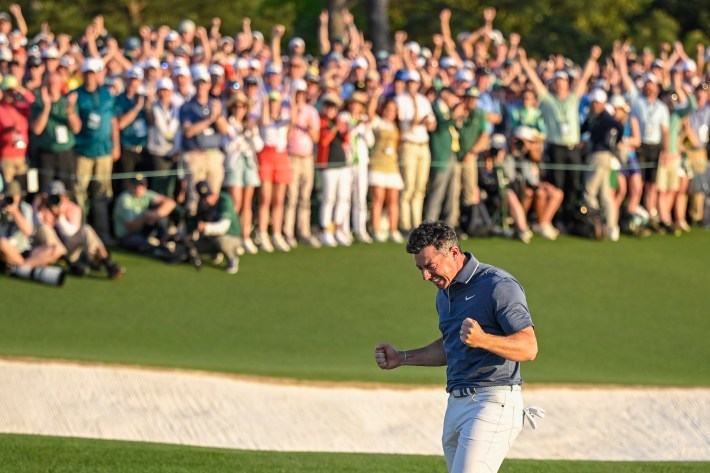
McIlroy's hideous 73 Sunday was good enough to win the 2025 Masters Tournament, although it took a playoff hole for him to finally bring it home. He almost biffed it! Nerves were a huge factor. After a second consecutive strong performance Saturday, McIlroy found himself at 12-under, two strokes ahead of second-place Bryson DeChambeau of LIV Golf, and leading a major tournament at the end of a round for the first time in, holy shit, 11 years. McIlroy started Sunday 18 holes away from the completion of a career Grand Slam and the fulfillment of a goal that has been evading him for what has felt like a lifetime. "I think I've carried that burden since August 2014," McIlroy recalled, after it was over. "It's very difficult. Today was difficult."
This was McIlroy's 17th appearance at the Masters. A win was going to be cathartic no matter what, but that the round was such a circus act perhaps explains why McIlroy's emotions on the final hole were quite so explosive. A clean Sunday would've given him more time to process the achievement. After nearly barfing it away several times, it was only when his putt rolled home on the playoff hole that McIlroy could experience anything but nerves, anticipation, and dread. This triumph was a painfully long time coming.
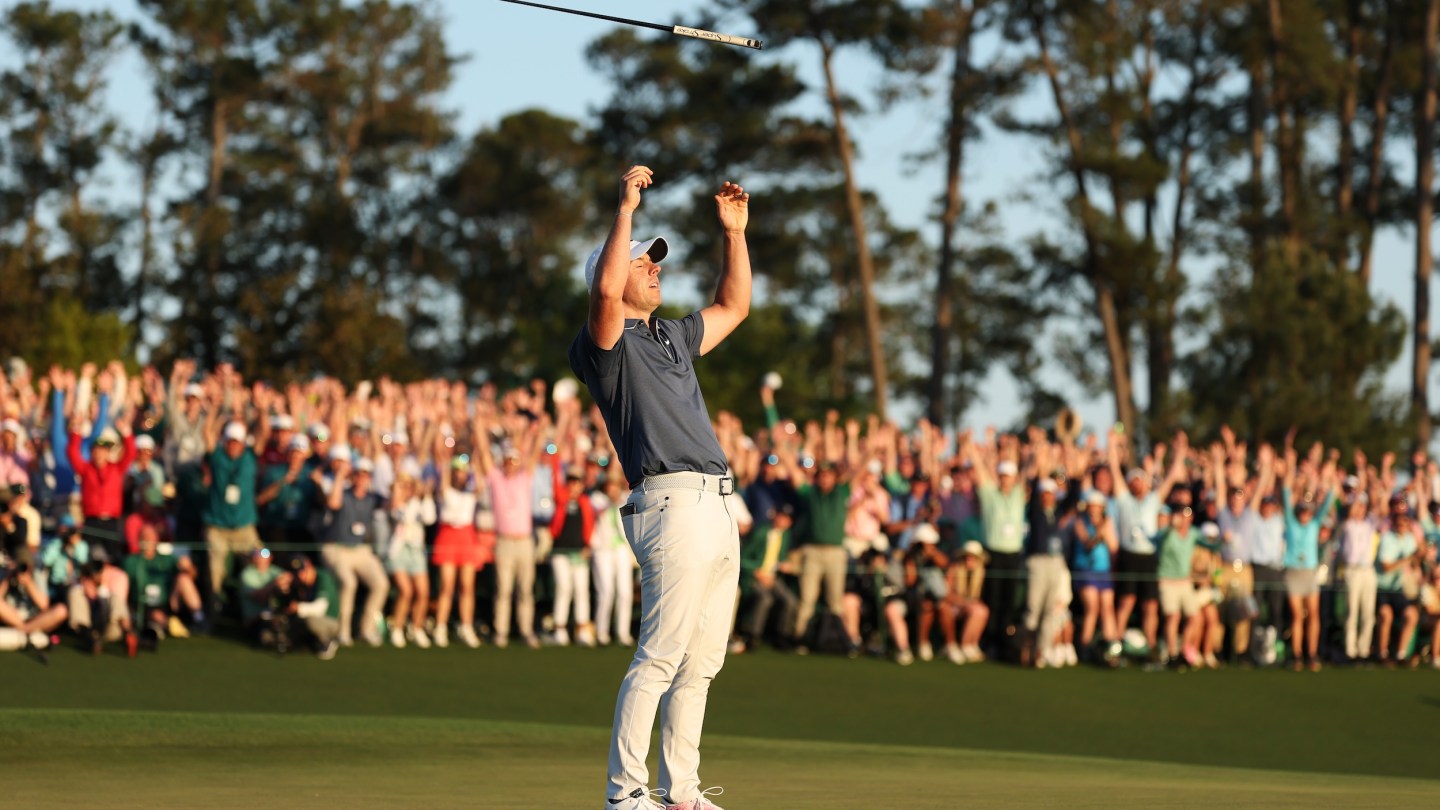
"Yeah, there was a lot of pent-up emotion that just came out on that 18th green," recalled McIlroy. "A moment like that makes all the years and all the close calls worth it."
His round Sunday, and in particular his back nine, was for the most part a bewildering, nerve-shredding mess. McIlroy opened his day with a double-bogey on the par-4 first, and then settled for par on the second, on a hole where he'd made eagle a day earlier. This slow start gave a one-shot lead to DeChambeau, but McIlroy stabilized somewhat and shot his way back under par by the finish of the ninth hole. He bogeyed the 11th, but things did not seem truly screwed until the par-5 13th. He laid up on his second shot, a cautious approach that immediately backfired: On his next shot, from about 100 yards, McIlroy found the fringe on the narrow side of the green, and his ball boinked downhill and rolled into Rae's Creek, the thin bubbling waterway that had been so rudely micturated into by amateur Jose Luis Ballester on Thursday. A subsequent brutal two-putt gave him a double-bogey on a hole that he'd birdied twice and eagled over the tournament's first three rounds.
"There were points on the back nine today when I thought, 'Have I let it slip again?'" McIlroy said. "My battle today was with myself. It wasn't with anyone else." He followed this miserable hole with a wide tee shot on the 14th, leaving his ball in some pine brush a few inches from the toes of spectators. His second shot found the fairway at the front of the green; a nice chip gave him a manageable putt, but he left it on the lip and settled for a second consecutive bogey, dropping him from the lead. It was impossible in this moment to believe that he would ever recover, and I do mean "ever."
Thankfully, this was not entirely a story of the field around McIlroy failing to grasp the opportunity. He hit a gorgeous, bold, incredibly clutch second shot on the par-5 15th, leaving him with a decent shot at eagle. Sure, yes, he missed the putt, but the birdie kept him in the hunt, and he followed that with another incredible approach shot on the par-4 17th, leading to another birdie. It wasn't a stirring, perfect recovery—he bogeyed the 18th, hence the playoff—but certainly there were enough clutch moments in there to say that McIlroy didn't fall backwards into a green jacket.
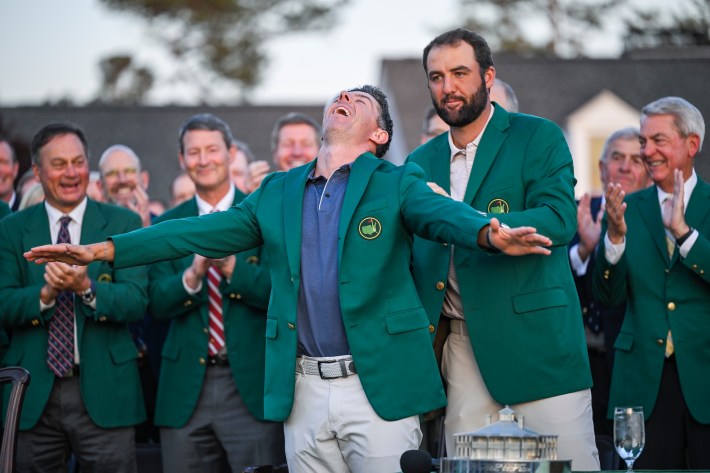
This major drought, McIlroy's leadership and seniority within the PGA, and the man's own greying temples sometimes make it possible to think of him as a much older person, closer to the back part of his career, running out of opportunities for signature triumphs. McIlroy is just 35 years old, too much younger than the author of this blog to be considered anything other than rude. Phil Mickelson won the 103rd PGA Championship when he was 50; Jack Nicklaus won his final major at the age of 46; Lee Trevino won a pair of majors in his mid-40s. These are exceptional cases, sure, but so is the winning of a golf major at any age. With a little luck and some good health, McIlroy should have lots of top-level golf ahead of him, now without the angst and pressure of a long-sought milestone.
"I think the last 10 years coming here with the burden of the Grand Slam on my shoulders and trying to achieve that," said McIlroy, of the massive unclenching at the day's 19th hole. "Yeah, I'm sort of wondering what we're all going to talk about going into next year's Masters." He'll still be shooting to win, of course, but it'll never look or sound or feel like this again.
